I currently share my life with two Siberian Huskies – puppy Lara (7 months old) and Shania (3.5 years old). Both of them are very silly, and very energetic. They love to play, explore, and hunt for earth critters.
Siberian Huskies are beautiful dogs who love people and love life. They can be great family dogs if properly trained. However, because of their high energy and high prey drive, they require a lot of daily exercise and are not to be trusted off leash. When bored, a Husky may chew, dig, and escape to look for adventure elsewhere.
Before getting a Sibe puppy, find out all you can about the wonderful nature of Siberian Huskies – the good, the bad, and the quirky.
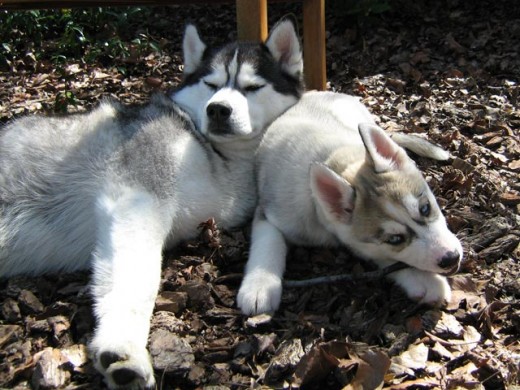
Siberian Huskies – The Good
1. Siberian Huskies are love bugs.
Sibes are very affectionate dogs. They are especially friendly with people, even strangers.
Husky Shania has very many friends in our neighborhood and she enjoys going to say hello to them every day. Her most favorite friend in the world is the Awesome Cookie Guy. Whenever we pass his house, Shania always stops and waits. When her Cookie friend spots her and comes out, he comes bearing gifts – a yummy low-fat cookie for Shania!
Shania also comes to me when I am sad or upset. She will lie down next to me or lay her head on my lap and give me licks.
The people trusting nature of Siberian Huskies make it easy to find caretakers for them when I get busy, or when I need to leave on emergencies or vacations.
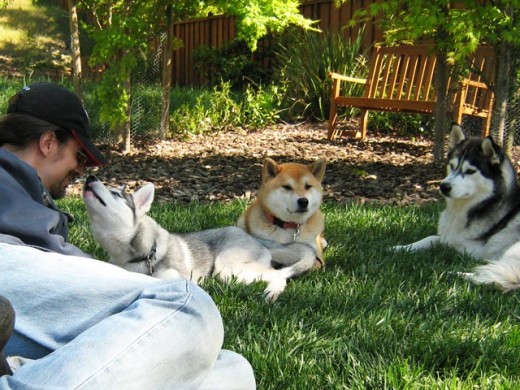
2. Siberian Huskies are athletic and have a strong zest for life.


Lara and Shania are frequently on the go. They enjoy re-landscaping our backyard, attacking bushes, pulling down trees, running, jumping, and digging. They both enjoy playing chasing games and are always ready to go out for a walk and explore. They get very excited whenever anybody comes to visit and enjoy spending play-time and rest-time with their pack.
As part of their zesty life program, Huskies also love to eat.
Both Lara and Shania will eat and eat and continue to eat more if they can. To keep them healthy and slim, I set up a fixed eating schedule and only give them their allotted amount of food. If I give them treats, then I reduce their regular meals a bit so that they keep a fairly constant caloric intake.
Sibes are not shy about stealing food or begging for food. Both Lara and Shania will steal each other’s food if they can. They will also steal from my other dog, Shiba Inu Sephy.
I always supervise them closely during meal-times. Food stealing can encourage food aggression, so I train my dogs not to steal and teach them that if there is any stealing, I will handle the situation.
Siberian Huskies can also get impatient about food and may get slightly overzealous when taking food out of your hand. Bite inhibition training is a must.
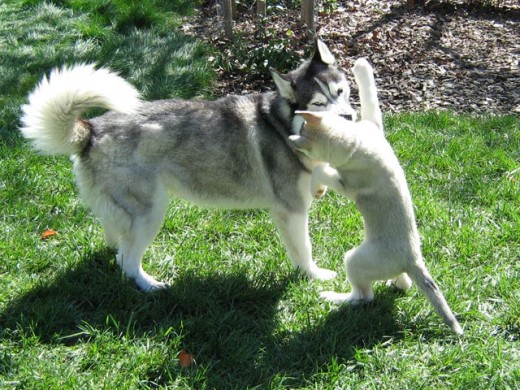
3. Siberian Huskies are clever and independent.
Reward Training
Sibes are smart and will quickly learn new commands and figure out interactive toy puzzles; especially when food is on the line.
Lara learned how to Sit on command as soon as we got her home (8 weeks old). In fact, if we use positive reinforcement techniques, we can start obedience training puppies as early as 6 weeks old. However, puppies should not be removed from the litter until they are at least 8 weeks old.
With clever and independent dogs like the Siberian Husky, it is most effective to use reward training techniques. I teach my Huskies that the best way to get what they want is to do what I want first. Here is more on how I trained my Husky puppy.
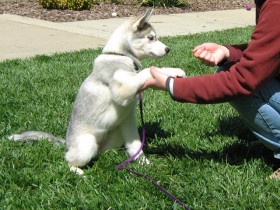
- If they want to go play in the backyard, they must first do a simple Sit next to the door.
- If they want their food toy, they must first do a Handshake.
- If they dig where they are not supposed to in the backyard then they lose their backyard privileges.
Since we control all of our dog’s resources, we can encourage good behaviors and discourage bad behaviors by tying those behaviors to our dog’s most desired resources.
With reward training my Sibes are always motivated to work. They are never hand-shy and love being with people. Siberian Huskies have a wonderful independent spirit, so we should not shock them, choke them, or physically dominate them into submission.

Siberian Huskies – The Bad
1. Siberian Huskies shed a whole lot.

Sibes blow their coat once or twice a year. During this time they will shed most of their undercoat and replace it with new fur. Frequent brushing will help to control some of this shedding and keep our Husky comfortable and clean.
Even though they may only blow their coat twice a year, Sibes actually shed all year round. There is Sibe fur everywhere in our house, including carpets, tile floor, counters, tables, chairs, blankets, and beds. Hair can also get onto kitchen utensils, food, and drinks.
Another issue to consider is pet allergies. Many people are allergic to dog or cat hair. Although Siberian Huskies have little doggy smell and are not one of the most allergy-causing breeds, a serious pet dander allergy of a family member should have you reconsidering a dog for your choice of pet.
~~[Siberian Husky Club of Canada]
Because they shed so much, try to make brushing and handling fun for your Husky. I always pair brushing sessions with food so that it becomes a fun and rewarding experience. I start with a soft brush and slowly switch over to using the Furminator which is awesome at getting out a dog’s undercoat.
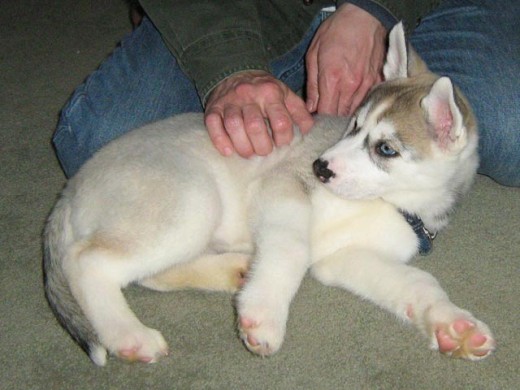
2. Siberian Huskies are awful guard dogs.

Sibes look wild, like wolves. For this reason, many people think that they make fierce guard dogs.
In truth, however, a Husky is more likely to invite strangers into your home with open paws and give them many licks.
Siberian Huskies are happy, goofy, and naturally trust all the people that they see.
My Siberians may sometimes make a fuss when people are at the door, but it is out of excitement rather than a warning cry.
Also, my Siberians will happily follow anyone home as long as they have some yummy pieces of food.
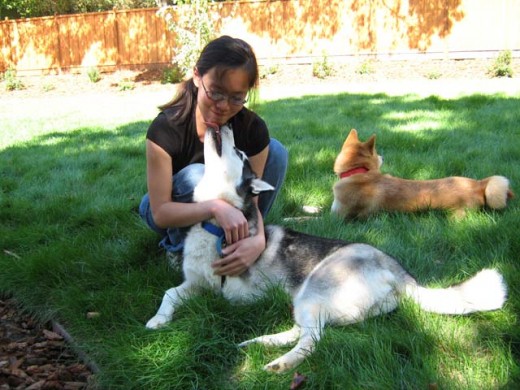
3. Siberian Huskies have very high prey drive.
Husky Shania is a very accomplished huntress.
When we first got our backyard landscaped, we had a big Earth Critter Attack. There are a fair number of rodents including gophers, voles, and mice that live in our area and they decided to throw a big party on our newly planted grass. Holes were appearing everywhere and the organic scent-based pest control we used did not seem to have much of an effect.
We were worried that our yard would not even last the year but then huntress Shania went into action. After a few days of hunting and marking, we noticed that the Rodent Gang had moved their party location somewhere else!
However, this high prey drive also makes it extremely risky to let a Sibe go off-leash in a non-enclosed space. If she spots a deer or squirrel, she will be gone and away before you can shout Stop. Siberian Huskies are very athletic and can cover large distances in a fairly short amount of time.
High prey drive also means that a Husky will have a strong instinct to chase and hunt cats and possibly also small dogs.

4. Siberian Huskies love to pull, pull, pull.


Sibes were bred to pull sleds, and today, they still love to PULL!
One of the biggest challenge with my Huskies is teaching them how to walk without pulling and/or to only pull on command.
The easiest way to leash train a Husky, is to start when she is young and still small. I have tried a variety of techniques with my dogs and what has worked best are the red-light,green-light technique and the 180-turn-around technique.
I started leash training puppy Lara almost as soon as we got her. First I trained her in our backyard. After she was fully vaccinated, I started leash training her around our neighborhood.
While leash training a Sibe, it is very important to be totally consistent. I stop as soon as puppy Lara starts to pull and if she pulls too much, I turn around and walk in the opposite direction. This teaches her that the fastest way to get to where she wants to go is to walk along with me at a measured pace.

5. Siberian Huskies love to sing.
Sibes have a great singing voice. However, neighbors may not particularly enjoy it when Siberians decide to sing or howl to the moon.
Husky Lara is a very vocal dog. She barks when excited, frustrated, scared, and sometimes when other dogs are barking. I have to spend more time and effort training her to stay quiet because her natural instinct is to vocalize.
Husky Shania is a more quiet dog. She almost never barks and the only time she vocalizes is when she is playing with my other dogs. She also sings beautifully when she hears a squeaky toy.
My Husky breeder tells me that there are some Sibe bloodlines that are more noisy than others. Lara’s mother, for example, comes from a more vocal bloodline.
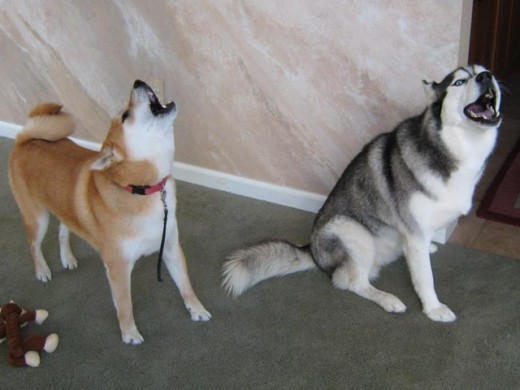
6. Siberian Huskies are a big time commitment.

Sibes are very energetic and affectionate. They like being with people and they also need something to do. Otherwise, they will get bored and get into at least 10 kinds of trouble.
All my dogs work for all of their food, either through obedience exercises, grooming sessions, play sessions, or through interactive food toys. In addition, they go for 1.5 hour daily walks and wrestle with each other several times a day. Sometimes, I join in on the fun and play flirt pole or the water hose game with them.
When bored or lonely, a Husky will figure out her own activities, which may lead to property damage or escape expeditions.
Do not get a dog, especially a Siberian Husky, unless you have a lot of free time to spend with her. If you must work long hours, consider dog daycare or hiring a dog walker. Sibes do best when there are many interesting activities throughout the day and frequent human supervision.

I Love Siberian Huskies
Sibes are awesome dogs. They are always ready of adventure, and they will be there to give you licks and support when you need it, or even when you don’t.
I got my Huskies through the breeder list from the Siberian Husky Club of America. I also considered adopting from my local Siberian Husky rescue, but did not find one that fit well with my Shiba Inu.
It is best to avoid backyard breeders, pet stores, and online pet stores. Such establishments almost always sell unhealthy puppies with poor temperaments.
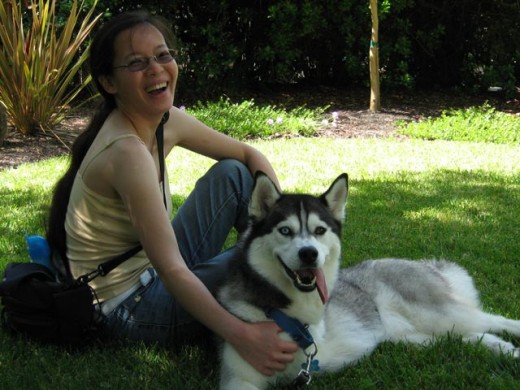
Source: Siberian Husky Pictures.
Hello,
My Siberian Husky is 1.5 years and is very active. She gets her 3 mile run in the morning with more play and 3 mile walk in the afternoon with her doggie playdate. When she is tired and I leave the house she is a perfect little angel, but when I do, for example, a 1 mile walk because I have errands I have to run and intend to work her extra in the afternoon usually when I come home she has done some kind of damage… She loves blankets, pillows, wood…
She is crate trained I just figured she had been doing so well I would try to leave her out of the crate when I leave the house.
Any ideas on how I can encourage her to not chew while I leave the house. I would love to let her roam versus lock her in the crate. (Note: every time I leave the house she gets a kong treat and plenty of toys she just ignores the toys…)
Christine
It could be separation anxiety. My Shiba Inu, especially, really needs a fixed daily routine. Sudden changes in his routine causes him to become anxious, and this could lead to displacement behaviors, including excessive licking and chewing.
This ASPCA article has more on separation anxiety.
The first thing that I do, is try to identify the source of my dog’s problem behavior – e.g. is it the result of anxiety or something else. This is where consulting with a good trainer can be quite helpful. Once I have a good idea what is causing the behavior, then I can take steps to alter it.
For separation anxiety, I very slowly desensitize my dog to alone time. I start with very short periods of alone time (seconds) and slowly build up from there. The ASPCA article above has more on the desensitization and counter-conditioning process.
More on dog anxiety.
More on how I deal with separation anxiety.
Hi, I have a 12 week husky girl named Denali. She’s super sweet and very shy. She’s starting to come around and open up to me but with that is coming lots of energy, chewing, and disobedience. I realize she’s just being a husky but my problem is sometimes I try to walk her and she’s so shy of people and dogs she doesn’t want to go far from home which makes it tough to tire her out as her reboot time is very quick. I take her for atleast 4 perday but i want to start taking longer walks if she would let me. Usually when I drop the leash she’ll stay with me but I’m nervous because she’s getting pretty fast and daring. How can I get her to trust me on leash that I won’t lead her into danger so that I can tire this little ball of energy down. Also I feel when she gets real bad its usually cause she has to go poop. Could that be the case?because the walks would solve both problems.
Heh, yeah, I have noticed that my Huskies do get more “excited” when they need to go, even during our walks. They start pulling a bit more, while looking for a good spot to do their business.
When I first started leash training my pup, she also didn’t want to go very far. That is fine, we walk around our house area, I play games with her (on-leash), we do fun footwork commands, and we just hang out outside, so she gets more used to being out with me on-leash. I also bring food with me, and I reward her well for following rules during our games and for doing fun commands with me.
In general, I want to make each walk short, fun, rewarding, and a big success. The more positive and successful walks she has, the more confidence and trust she builds. Similarly, negative events will undermine my dog’s confidence and trust, significantly set back training, and worsen fear symptoms. Therefore, I try my best to always set her up for success. As she gains confidence, we very slowly increase our distance, but at a pace that she is comfortable with.
More on how I leash train my puppy.
Both my Huskies have high prey drive, so I only walk them on-leash unless we are in a fully enclosed area.
I also do people desensitization exercises with my pup, and we did puppy classes early on to help with her socialization.
ASPCA article on puppy socialization.
More on dog socialization.
Puppies still have developing immune systems and are more susceptible diseases though (especially before they are fully vaccinated), so I make sure *not* to take my puppy to places where there may be contaminated poop, water, etc., from other dogs or other animals.
When I get a new puppy, I find frozen Kongs to be very very useful. My Husky pup loves to eat, and working for her food takes up a bunch of her time, energy, and helps her to calm down. I sit with her and help her with each Kong, so that is also a great way to earn trust and build a good bond.
More on how I train my Husky puppy.
More on how I set up structure and teach my pup self-control.
Hope this helps and big hugs to Denali! Take lots of pictures coz they grow up very quickly. 😀
Okay so I have a super quick question. I have a 7month old puppy and I noticed that she sleeps all day long and when I try playing with her, she plays for about 15 minutes and then stops because she gets tired. Is that normal? What can I do to make it stop? Another thing would be is it the food I give her? Because she was given to me by a friend and he would feed her adult food. I don’t know if that’s the problem so should I change it?
How long have you had her? Has she been fully vaccinated? Is she eating and drinking normally? Has she been to the vet? When I get a new puppy, I take her to the vet as soon as possible to make sure that everything is ok, and to get advice from my vet on vaccinations, heartworm prevention medication, etc.
As for food, I feed my dogs puppy food until they are about 1 year old, then I switch to adult. I make sure to pick a good brand, which has good sources of protein and not much filler ingredients. My Huskies have very sensitive stomachs, so I am very careful about what I give them.
More on how I pick my dog’s food.
Congratulations and big hugs to your pup!
I’ve had her for about three months now which I thought was weird because at first she was okay she would always eat normally until now. She’s still not done getting all of her shots, I believe she has three more to go. As for the food, she eats Purina one smart blend that has lamb and rice formula. All she’s been doing lately is sleeping 🙁
I would take her to the vet as soon as possible to make sure that everything is ok.
First of all I love your website but I need some advice.
I have a 7 month old husky at home. She has shown some resource guarding tendencies with food but we have been practicing for months with drop it, switching out, hand feeding etc. She’s done MUCH better, yet randomly she’ll guard something we don’t expect. Last night she was in her favorite spot behind a chair. My mom went to get her to go outside before bed and she growled and snapped. Didn’t bite, but was gave a warning. I came over and she growled at me as I came near the chair. I stopped because I knew she probably felt like she was being ganged up on. Today she was in her spot again. I got a favorite treat of hers and sat near her spot and hand fed her the treat. She was good but growled lowly if I touched a paw. Am I going about this the right way? It’s frustrating because I feel like it’s a never ending battle. 🙁
When I need my dog to do something for me, e.g. get off furniture or go outside to do their stuff, I put it under command control.
For example, if I need my Husky to go outside, I call her to me. When she comes, I make a big deal out of it and reward her very very well, with her favorite food, with her favorite game, and more. Then I open the door, go outside, and call her to come along. I reward her again for doing that. In this way, going outside becomes something fun, positive, and very rewarding.
ASPCA article on recall training.
What has worked well for my dogs is to train them on desirable and positive behaviors, and get them into a routine of working for the things that they want. Then, when they do something undesirable, I can redirect them and tell them what to do instead.
I set up a fixed routine and a consistent set of rules for all of my dogs. I also follow the Nothing in Life is Free program with all of them.
More on how I trained my Husky puppy.
More on how I teach my puppy self-control.
How I desensitize my dog to hugging and touches.
ASPCA article on puppy socialization.
More on dog socialization.
However, dog behavior is very context dependent, so the temperament, routine, and environment of the dog will all play a big role. When in doubt, especially in cases of aggression, I get help from a good professional trainer/behaviorist.
https://www.aspca.org/pet-care/virtual-pet-behaviorist/finding-professional-help
https://apdt.com/pet-owners/choosing-a-trainer/
Hello, Is there a certain type a breed a husky gets along with better?, my sister has a boxer/pit-bull mix and we have introduced them to each other so they can play but they did not like each other at all they were very aggressive towards each other mostly my sisters dog towards my husky. So i wanted to ask was dogs do a husky get along with the most?
That depends a lot on the temperament of the dog, his past experiences, socialization, environment, and more.
http://www.badrap.org/dogdog-tolerance
I do dog to dog desensitization exercises to raise my dog’s tolerance threshold and to help him be more calm and relaxed in the presence of another dog.
http://shibashake.com/dog/dog-to-dog-aggression#desensitize
Positive socialization is also an important part of dog-to-dog interactions.
http://www.badrap.org/smart-socializing
http://shibashake.com/dog/dog-socialization-what-why-how
There are certain breed characteristics that make some dogs more or less likely to get along with my Huskies. For example, Sibes tend to have high prey drive and my two girls certainty do have that. They also like to wrestle and play pretty rough, so smaller dogs get overwhelmed by them pretty quickly. As a result, small vocal dogs are not very compatible.
More on what I look at when picking a second dog.
More on what I do to help my dogs get along.
Hi there, We adore your dogs. We have a 7 month old husky puppy ‘Oia” that we love. One challenge with Oia is that she is not yet fully potty trained. She goes outside on her morning walks but sometimes she is up before us (it is summer) and she goes without us knowing. This is when she isn’t waking us up to say I have to go! With evening walks as well she goes outside on most occasions. But sometimes she goes in the afternoon in the house. We have given her a spot in the house where she can go (since she was 7 weeks old). But we would like to wean her off of this spot and get her to potty outside ONLY now. Do kindly share suggestions on how we can move her outside ONLY. We do have a ‘go potty’ command that she understands. She is still peeing at least 4 times a day.
We are now thinking about getting a second puppy and we’re wondering what your thoughts are on getting a 2nd husky vs. a beagle or some other dog? We keep thinking that a dog with similar energy levels will help. On the other hand, a puppy that’s a bit more calm with a lower energy level might help Oia chill out. We do love enjoy being outdoors, running and hiking with Oia. Thanks so much!
Arthi
With my puppy, I usually have her indoor potty area close to the backyard door. If that is not the case, one possibility is to slowly move the indoor potty area closer and closer to the backyard door. In this way, when my puppy needs to go, that is where she will go, and I know that I need to let her out.
More on how I potty train my puppy.
My Huskies do pee several times a day, probably 4 times or more. I think that is good and healthy. With my Shiba, I always have to think up ways to get him to pee more because he has a tendency to want to hold it in, which according to my vet is not the best way to go.
As for getting a second dog, it depends a lot on Oia. What are the types of dogs that she likes to play with? How does she do with a smaller dog? Both my Sibes like to wrestle and play rough, so smaller dogs may sometimes get overwhelmed by them. My Shiba is around 32 pounds, so he is smaller, but he also enjoys wrestling, he is quick, and he is crazy bold.
We did socialization training with Sephy (Shiba) at our local SPCA when he was young, so he got to meet lots of dogs from there, and we could see the types of dogs that he really enjoyed, the ones that he didn’t get along with, and also the ones that didn’t like him. 😀 That was very helpful when picking a second dog.
More on how I picked a second dog.
Hope this helps. Big hugs to Oia!
Hi, we just adopted Husky siblings, male and female. They are just shy of 14 weeks old. We are attempting to crate train/potty train by using the training methods recommended by you. The problem is that I do not have any command over them after I put the leash on-the male is the calmer of the two and is easier to control but the female just wants to jump up in the air-not even on people, run, and play. It is difficult for her to focus. I do not feel safe when I take them out on the leash to potty. She instigates and he joins in jumping up, pulling and getting tangled around my legs. I have fallen a few times already, since we had a lot of snow this winter in NY and fear walking down the four concrete steps after I get out the door. I have tried taking one out at a time, but by the time I get back in, the other has peed in the crate. Hiring a professional trainer would be ideal; however, we do not have the money at this time. Please advise. Thank you for all of the info that you provide on your website. It has been so helpful.
Warm regards,
Denise
While potty training my Husky puppy, I sometimes use a puppy enclosure with puppy pads. For example, if my puppy is sleeping and I need to attend to one of my other dogs, I put her in the pen with puppy pads. In this way, if she wakes up and has to go, she can do it on the pads.
More on how I potty trained my puppy.
More on how I train my Husky puppy.
Congratulations on your new pups! I have only gotten one puppy at a time. They have a whole lot of energy, so I have my hands really full with just one. 🙂
We just adopted a 6 year old female husky from a previously neglectful owner who did nothing to train her and before that owner she was a stray. When we got her she was a very quiet and under weight but now we have had her for nearly 3 months and she has begun to get back to her healthy weight. But the first time we took her to a vet she was diagnosed with heart worms. The treatment for them requires her to stay still with very minimal exercise except to use the bathroom. since we began the treatment so soon after we got her we did not have a chance to train her fully. she had begun to learn to sit and to not jump. But since the treatment and the lack of exercise began she has stopped listening unless enticed with a treat and she barks when left alone.We know sibes are supposed to have a lot of exercise but the treatment stops us from letting her. Do you have any tips to get her to listen better/be trained and to be more calm without her normal amount of exercise?
Yeah, it is not easy to keep a Husky occupied and not moving too much. One thing that has been helpful for my dog are frozen Kongs. When my Husky is recovering from soft tissue damage, I feed her most of her daily food through frozen Kongs. The great thing with Kongs is that she can work on it lying down, and it keeps her occupied. My Husky is very food focused so she is very motivated to work on the Kongs, and they give her something engaging to do.
http://shibashake.com/dog/best-dog-toys#kong
During recovery, I also spend more time with my dog. We do grooming exercises, focus exercises (Look), and anything else that does not require much movement. If necessary, I keep her in a safe but confined area (pen), so that she cannot start playing with my other dogs, or start moving around too much. If necessary, I also use this opportunity to train my dog to get used to alone time. I start with very very short periods of alone time, and very slowly build up from there.
I follow the Nothing in Life is Free program with all of my dogs, so they work for all of their food. In this way, I can reward them well for doing commands for me, they stay occupied, and I make sure they do not over-eat.
Hi, i have 2 sibes, 1 is charlie nearly 3 years old and opie nearly 2 years old. I have only just bought these beautiful dogs from owners who couldnt cater to their needs, charlie although has taken this transaction quite harsh i am doing my best to hand feed him every night but he doesnt eat much and will refuse once he has eaten. I am quite concerned for charlie and i am running out of ideas to get him to eat, i have cooked nice meals for him and everything but no matter what i do for him he just wants his owners back to him. Is there anyway i can help him adjust or get him to eat properly
Have they been to the vet? When I get new dogs, I usually take them to the vet for a check-up to make sure that everything is ok. Once I am sure that everything is ok physically, then I can start to look at other causes.
When there are big changes with my dog, he also gets pretty stressed. The last time we moved houses, I set up a fixed schedule right away and also a consistent set of rules. This helps to create certainty, and certainty helps to reduce stress. My dog also loves going hiking, so we went on lots of quiet hiking trips, during off-hours, so he had a fun outlet for his anxious energy and a quiet place to relax.
More on dog anxiety.
Hi i have a 6yr old husky and as of recent she has been crying and jumping at t he back door whenever im not outside and shes not in any ideas what this could be? She is an inside and outside dog anf does have a companion.she doesnt like alot of toys, doesnt play with them
What is her daily routine like? When did this behavior start? Did anything change around that time – either in her routine or yours? Did she get stressed or frightened by anything?
Dog behavior is very context dependent and there is very little context here, so it is difficult to say. Based on what you describe, it could be separation anxiety, but is hard to say.
https://www.aspca.org/pet-care/virtual-pet-behaviorist/dog-behavior/separation-anxiety
http://shibashake.com/dog/separation-anxiety-dog-why-how-reduce-dog-stress
More on dog anxiety.
When in doubt, I get help from a good professional trainer.
https://www.aspca.org/pet-care/virtual-pet-behaviorist/finding-professional-help